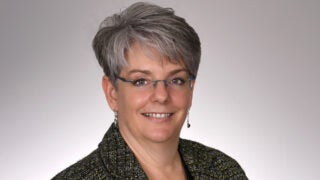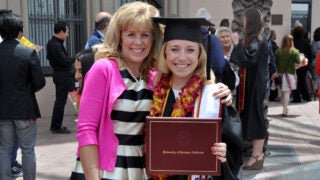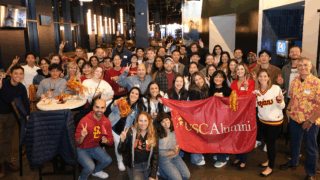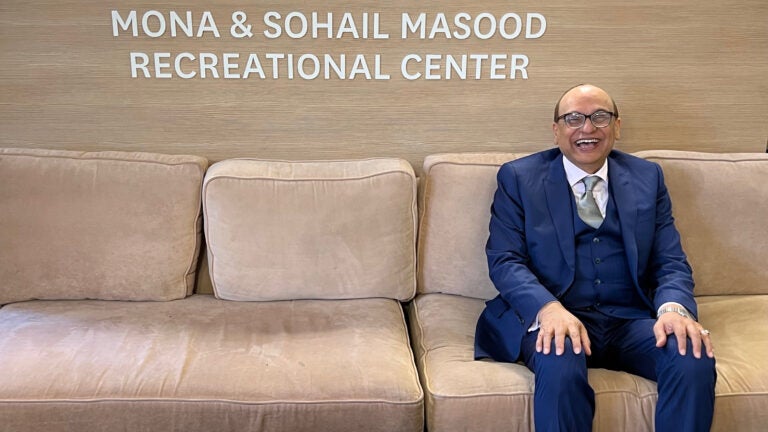
Sohail Masood PharmD ’88, shown here at the Mona and Sohail Masood Recreational Center used by faculty, students and staff of the USC Alfred E. Mann School of Pharmacy and Pharmaceutical Sciences, says his clinical training at USC has been the foundation of his life’s work. (Photo courtesy of Sohail Masood)
Sohail Masood: Home infusion pharmacy trailblazer
Pioneer, patient advocate, philanthropist — the USC Mann School alumnus has worn many hats during his more than 35-year career as a health care entrepreneur and CEO.
In the late 1980s, when Sohail Masood PharmD ’88, was attending the USC School of Pharmacy (now known as USC Alfred E. Mann School of Pharmacy and Pharmaceutical Sciences), a clinical rotation sparked his interest in an emerging specialty.
The HIV/AIDS epidemic had prompted a burgeoning demand for home infusion therapy, in which patients receive intravenous medications, fluids or nutrients in the comfort of their own homes. As Masood visited homes in South Pasadena and East Los Angeles for his home infusion clinical rotation, he forged meaningful connections with patients and their families. During infusion treatments, which often lasted several hours, Masood listened to their stories and dispensed both medicine and empathy.
“I really was fascinated by the humanity of this side of pharmacy,” Masood says. “I didn’t feel the same when I was doing retail pharmacy, where I was standing behind the counter.”
Today, after more than 35 years in the field, Masood is widely regarded as a pioneer in home infusion pharmacy. He has founded three home infusion companies throughout his career, including KabaFusion, where he currently serves as chairman and CEO. KabaFusion is the largest privately held home infusion company in the United States and was recently acquired by Nautic Partners for $2.2 billion.
A serial entrepreneur, Masood is driven to make infusion therapy easier and more affordable for patients and to increase patient access to novel medications. Nearly four decades after his first home visit, his passion for serving patients has not dimmed. “I’m still very much in love with this industry,” he says.
Masood considers his clinical training at USC Mann to be the “miracle” that opened the door to his life’s work. “The foundation [of my career] was created at USC,” he says.
“Dr. Sohail Masood embodies the innovative spirit we champion at USC Mann,” says Vassilios Papadopoulos, dean of USC Mann, John Stauffer Decanal Chair in Pharmaceutical Sciences and professor of pharmacology and pharmaceutical sciences. “His entrepreneurial journey is a powerful example for our students and alumni of how a pharmacy education can be a launchpad for groundbreaking ventures that improve countless lives. He is a testament to the powerful impact a single individual can have on their field and on their community.”
Overcoming adversity
Success as an entrepreneur and CEO has contrasted sharply with the hardship Masood faced as a child in Lahore, Pakistan. “My father died at 42 when I was 6 years old and left my mom, a 36-year-old widow, with eight kids and no source of income,” Masood says. “It was a tough life.”
He came to the United States in 1981 at the age of 19 to pursue higher education. During his time at USC Mann, he lived with four other people in a studio apartment. “I was eating sloppy joe for dinner every night and having a Snickers bar for lunch, because that’s all I could afford,” he recalls.
In Arabic, Masood’s name means “lucky star” — and he feels that he has lived his life under one.
Yet Masood measures his success not by the valuation of his company, but by the impact he has had on patient lives. “Money is always a byproduct [of success],” he says. “In health care, the goal should be improving [patients’] lives.”
Raffi Svadjian, assistant professor of clinical pharmacy at USC Mann, notes that home infusion pharmacy improves the quality of patients’ lives in a variety of ways. “The immediate benefit of home infusion pharmacy for patients is the one at face value, which is the convenience and comfort of being in your own home,” says Svadjian, the executive director of USC community pharmacies. “What may not be as clearly visible is the psychological impact on the patient of not having to go to a hospital or acute care facility. The infusion becomes part of the patient’s daily routine.”
Giving back
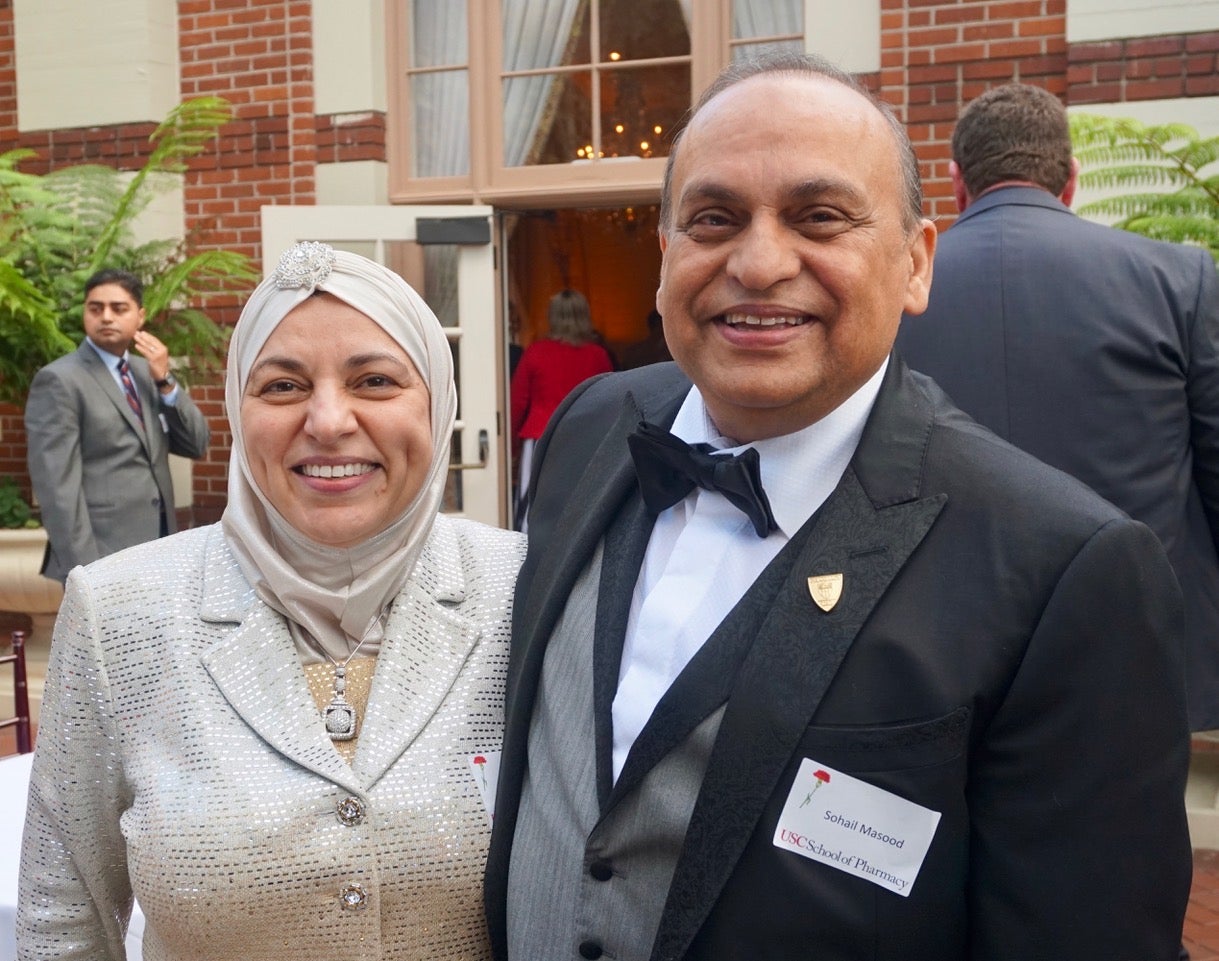
Staying connected to USC has been important for Masood over the years. “If I didn’t have that education, I wouldn’t have had all this success in life,” he says. “Everything came from the education that I got at USC. They gave me the confidence; they gave me the knowledge.”
Masood was honored by USC Mann in 2019 with the Most Distinguished Alumni Award for his philanthropy and service to the school.
“As a distinguished alumnus and a dedicated member of our Board of Councilors, Sohail embodies the very best of USC — combining professional excellence with a deep-seated commitment to giving back,” Papadopoulos says.
Pioneering access to a novel treatment
After graduating from USC Mann in 1988 and completing a residency at Brookdale Hospital in the Brooklyn borough of New York City, Masood returned to Los Angeles to establish and run a home infusion pharmacy at Good Samaritan Hospital.
There, he met W. King Engel, a renowned neurologist affiliated with Good Samaritan Hospital and the USC Neuromuscular Center. “One day he came to my office and said, ‘Dr. Masood, I think that there is this drug that can benefit my patients — something called intravenous immunoglobulin (IVIG),’” Masood recalls.
Masood knew nothing about IVIG, which involves administering antibodies (proteins that fight infection) into the bloodstream through intravenous infusion. At the time, the drug was primarily used in hospital intensive care units. But as Masood researched the treatment and learned of its benefits, he agreed to work with Engel to test IVIG on two of his wheelchair-using patients who were diagnosed with chronic inflammatory demyelinating polyneuropathy (a rare autoimmune disorder affecting peripheral nerves).
“We gave both of them five days of IVIG at the hospital, then two weeks off and five days on again,” Masood says. “The mobility of both patients markedly improved.”
From that point, IVIG became a focus of Masood’s work. He and Engel embarked on research that demonstrated the treatment’s effectiveness for various autoimmune-based neuromuscular diseases.
In 1992, Masood and his wife, Mona, who is also a pharmacist, started their own home infusion pharmacy business called Ultracare out of a rented warehouse in Paramount, Calif. The company delivered IVIG to the first two neuromuscular patients in the state who were treated at home, pioneering a practice previously limited to hospitals. In 1995, he expanded Ultracare’s services to include nursing and rebranded the firm as Crescent Healthcare.
Masood worked to educate physicians on the clinical benefits of IVIG in neuromuscular disorders. Through research, he contributed to the growing body of knowledge that led to the use of IVIG for an expanding array of diseases, including multifocal motor neuropathy, stiff person syndrome and small fiber neuropathy.
When Medicare policy changed in 1997 to discontinue coverage of IVIG for patients with chronic inflammatory demyelinating polyneuropathy, Masood stepped in, knowing that interruptions in therapy could cause patients to require a wheelchair for mobility. He continued supplying Crescent’s patients with IVIG at his own cost for six months — a financial risk estimated at over $2 million. After Masood lobbied policymakers and mobilized physician support, Medicare reversed its decision and restored coverage later that year. In 2003, he also successfully lobbied for Medicare expansion to include IVIG coverage for pemphigus and pemphigoid, which are autoimmune dermatologic diseases.
Entrepreneurial spirit
Masood and his wife, Mona, started Ultracare with a $50,000 line of credit. The company that later became Crescent Healthcare expanded to eight offices statewide and generated more than $80 million in revenue by 2004, when the majority of the company’s shares were sold to a private equity firm. In 2011, the company was acquired by Walgreens.
In 2002, Masood founded MAAS Medical to develop a first-of-its-kind digital infusion pump, a device that draws intravenous fluid from an IV bag and delivers it into the body. His innovation enabled remote monitoring of the infusion, reducing the need for nursing care. In 2007, Baxter, a competitor, acquired MAAS Medical.
Masood returned his focus to home infusion pharmacy and IVIG when he founded KabaFusion in 2010. He has grown the company from a single-state operation to one that now covers all 50 states, with 34 brick-and-mortar pharmacies nationwide and about 2,000 employees. The Cerritos location of KabaFusion offers an internship program for USC Mann students.
“KabaFusion is a leading home infusion provider, not just from the financial point of view, but also from the clinical excellence in patient care,” he says.
His business acumen has earned Masood the EY Entrepreneur of the Year award three times: for Crescent Healthcare in 1999 (regional) and for KabaFusion in 2017 (regional) and 2023 (national). In 2022, he received the Gene Graves Lifetime Achievement Award from the National Home Infusion Association, the organization’s highest honor.
Labors of love
In 2010, Masood founded the Dysimmune Diseases Foundation, a nonprofit organization dedicated to providing financial support for research into various autoimmune diseases. Developing new, effective treatments for such diseases is a long-held dream of Masood’s. A recent study initiated by the foundation is investigating IVIG as a treatment for diabetic neuropathy.
And in 2018, he and Mona helped their son Omar, who has Down syndrome, found Omar’s World of Comics, a comic book store in Lexington, Mass., about 10 miles from the family’s residence in Weston. “This is my happy place,” Masood says. An expansion four years ago added a bistro and a video game lounge run by Masood’s daughter, Laila, and her husband, Henry Neill Jones. Many of the employees there have Down syndrome or other disabilities; the store also serves as a vocational training site for students in disability-services educational programs..
Masood describes this venture with a phrase that also applies to the rest of his career: “This is a labor of love.”

